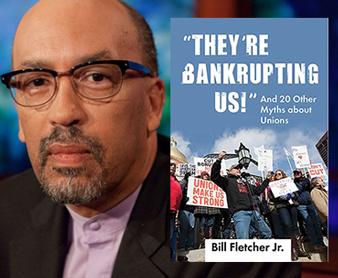Black union activists: Time to organize workers from the grassroots up
By Saeed Shabazz -Staff Writer- | Last updated: Jan 14, 2013 - 11:08:28 AMWhat's your opinion on this article?

|
However, Mr. Fletcher’s arguments may seem fleeting given the recent attacks against organized labor by Republican-dominated state Legislatures in the form of laws, such as the one passed in Michigan in Dec. 2012, barring public and private workers from being required to pay union fees as a condition of employment. Twenty-three states have laws restricting public workers’ right to bargain collectively.
“We have to build a new labor movement,” Mr. Fletcher explained to The Final Call. “We need a leadership that understands the labor crisis from the ground up—not this top-down module now in existence.” He also said that the traditional trade union may not be necessarily relevant to someone that’s unemployed or underemployed.
Dr. Steven Pitts, labor policy specialist at the Univ. of Calif.-Berkeley told The Final Call that unions across the board have to change the way they relate to workers. “In this racially stratified society, union leadership must learn to deal with Black workers’ issues that oftentimes get lost, because unions only want to talk about wages not racism and discrimination,” Dr. Pitts said. “Race remains perhaps one of the most pressing issues for organized labor,” offers Mr. Fletcher
A March 2012 study which appeared in the American Journal of Sociology titled “Organized Labor and Racial Wage Inequality in the U.S.” it was stated that “African Americans join unions for protection against discriminatory treatment in nonunion sectors.”
Mr. Fletcher notes that one major nonunion sector in the U.S. today is Wal-Mart which he says is the largest employer in the USA, with an 18 percent Black workforce, and average salaries starting at $8.81 an hour.
Both Mr. Fletcher and Prof. Pitts, who earned his doctorate in economics, agree that Black and Latino workers continue to be on the sidelines of the organized labor movement in the U.S. The U.S. Dept. of Labor Bureau of Labor Statistics reported that 15 percent of Black men and 14 percent of Black women were represented by a union in 2011, while the rate for Latino men was 10.8 percent, women at 10.7 percent.
Muhmet McClain, 63, is a retired construction union laborer in NYC, and he says that the union did nothing to help him maintain employment—often acting as if they really didn’t want his membership.
“If it weren’t for the community organization I joined back in 1990, I would never have worked long enough to retire with a pension,” he told The Final Call.
“I worked on Wall Street for 40 years, and I never knew a Black man could bring home $1,500 a week working as a laborer,” Mr. McClain admitted. “But, what is unbelievable are the roadblocks that the trade unions put up against Black and Latino workers,” he said.
“That’s because there is no labor movement, it’s been co-opted by the corporate fact-cats,” argues Jim Haughton, the octogenarian ‘Dean’ of the grassroots movement in NYC to Blacks and Latinos into the construction trades. A longtime labor activist and founder of Harlem Fight Back, who worked with A. Philip Randolph, founder of the Pullman Porters union, Mr. Haughton fought for the right of Blacks and Latinos to work on the construction of the original World Trade Center and the Harlem State Office Bldg.
“Today the plight of Black and Latino workers has us begging for jobs,” Mr. Haughton said. The DOL reports that in 2011 among full-time wage and salary workers – union median weekly income was $928—nonunion median salary $729.
Prof. Pitts understands Mr. Haughton’s position, and explains that is the reason for developing the National Black Workers Center Project with centers in New Orleans, Baltimore, Philadelphia, Jackson, Miss., Los Angeles and Chicago. One of the stated purposes for the centers is to “promote a dialogue around innovative approaches to the Black job crisis”.
Saladin Muhammad of the North Carolina-based Blacks Workers for Justice told The Final Call: “What has become problematic in terms of the labor movement is that it has only identified itself as a trade union movement.” But, it is now apparent that the labor movement must become a new civil rights movement, he added.
Mr. Muhammad said that one of the conclusions from the three-day gathering, Dec. 7-9, 2012 in Charleston, NC, known as the Southern Workers Assembly was that a new labor movement must not just be about fighting for wages. “But, fight for empowerment at the workplace and in the community,” Mr. Muhammad said.
Royce Adams, a member of International Longshoreman Assoc. Local 1291 in Phila. argues that organized labor is in retreat. “But, that doesn’t mean that Black and Latino workers must follow suit,” he told The Final Call. “We have to use 2013 to get workers together, no more trade unionists not identifying with the service sector workers,” suggests Mr. Adams.
“The centers are perfect for us to just meet and discuss strategies,” Mr. Adams said.
INSIDE STORIES AND REVIEWS
-
-
About Harriett ... and the Negro Hollywood Road Show
By Rabiah Muhammad, Guest Columnist » Full Story -
Skepticism greets Jay-Z, NFL talk of inspiring change
By Bryan 18X Crawford and Richard B. Muhammad The Final Call Newspaper @TheFinalCall » Full Story -
The painful problem of Black girls and suicide
By Charlene Muhammad -National Correspondent- » Full Story -
Exploitation of Innocence - Report: Perceptions, policies hurting Black girls
By Charlene Muhammad -National Correspondent- » Full Story -
Big Ballin: Big ideas fuel a father’s Big Baller Brand and brash business sense
By Bryan Crawford -Contributing Writer- » Full Story






 Click Here Stay Connected!
Click Here Stay Connected!








